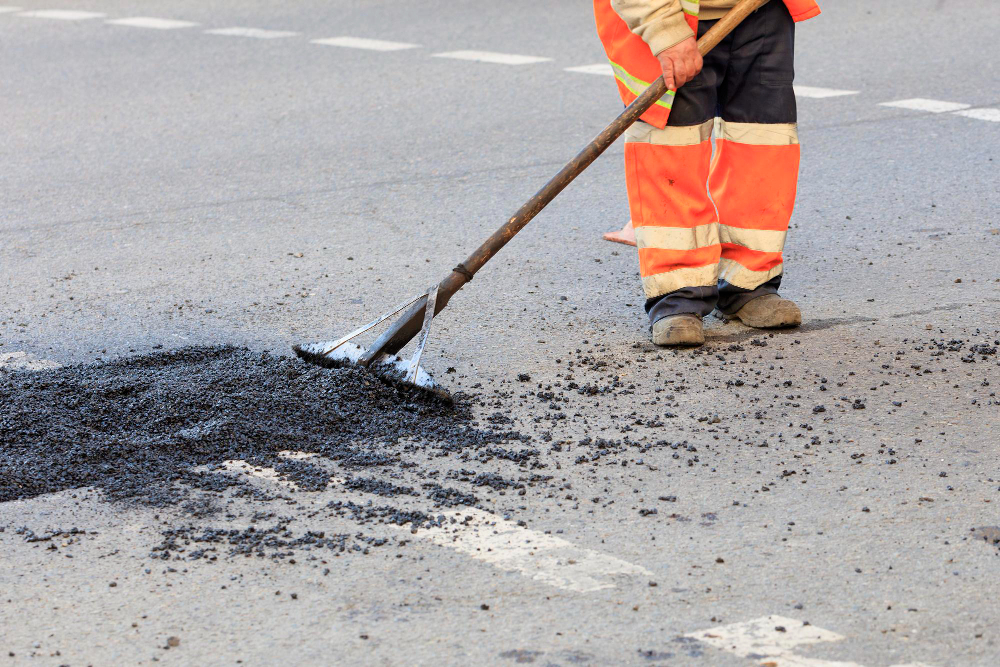
If you’re dealing with potholes or small cracks in your driveway or parking lot, you may have heard about cold patch asphalt as a quick and budget-friendly solution. But how do you know it’s the right repair method for your needs? And more importantly, how can you ensure your repair stands the test of time?
This guide breaks down when to use cold patch asphalt, its benefits, and practical tips to make your asphalt repairs last longer. By the end, you’ll know when it’s worth tackling a job yourself and when you should call in the experts.
Cold patch asphalt is a ready-to-use material designed for minor asphalt repairs. Unlike traditional hot mix asphalt, it doesn’t require heating or specialized equipment to apply. Instead, it can be poured right out of the bag or bucket and compacted into cracks, potholes, or uneven surfaces in your driveway or parking lot.
The convenience of cold patch asphalt makes it a favorite for DIY enthusiasts and small-scale repairs. However, it’s essential to understand its limitations and strengths to use it effectively.
Not every asphalt issue can (or should) be solved with a cold patch. Here are the most common scenarios where using cold patch asphalt is appropriate:
Cold patch asphalt works best on minor potholes in residential driveways, small parking lots, or low-traffic areas. Its application is simple, making it ideal for quick fixes when you don’t want to pay for professional hot mix repairs.
If cracks in your asphalt are shallow and less than half an inch wide, cold patch asphalt can seal them temporarily. This prevents water infiltration, which can cause further damage by freezing and expanding.
Cold patch asphalt is a great temporary solution for asphalt repairs. If you’re waiting for warmer weather or scheduling professional services in Daytona Beach, FL, cold patch repairs can serve as an effective stopgap.
Because cold patch asphalt isn’t as durable as hot mix asphalt, it’s more suitable for areas with light vehicle or foot traffic. Driveways and walkways are prime candidates.
Hot mix asphalt requires high temperatures to apply, making it challenging to use during cooler months. Cold patch asphalt, on the other hand, can be applied year-round, as it doesn’t rely on heat for performance.
Why is cold patch asphalt such a popular choice for asphalt repairs in Daytona Beach, FL? Here are its standout advantages:
You don’t need heavy equipment or technical expertise to apply it. Just open the packaging, pour it into the repair area, and compact it with a tamper or even your car’s tire.
Cold patch materials are significantly cheaper than hiring a professional repair crew for mild damage.
The material sets quickly, allowing repaired areas to be used almost immediately.
Cold patch asphalt can be used during any season, making it ideal for unexpected repairs during rainy or cooler months in Florida.
To get the most out of cold patch asphalt, follow these simple yet crucial steps:
Start by clearing debris, loose asphalt, and dirt from the pothole or crack. Proper cleaning ensures the material binds tightly to the surface, improving durability.
Although cold patch asphalt can handle moisture better than hot mix products, it’s still ideal to work with a dry surface for maximum adhesion.
Pour the cold patch material directly into the pothole or crack. Spread it evenly to ensure the surface is level and uniform.
Proper compaction is critical for a sturdy repair. Use a manual tamper or drive your car slowly over the area to ensure the material is firmly packed.
While cold patch asphalt sets quickly, it’s best to give it some time to solidify before subjecting it to heavy traffic. Usually, 24-48 hours is sufficient.
Over time, keep an eye on the repair site. Topping off any sinkage or addressing new cracks promptly will extend its lifespan.
While cold patch is convenient, its durability can be enhanced with a few extra steps:
Sealcoating applies a protective layer over your asphalt, preventing water infiltration and sun damage. Consider adding this step once your cold patch repair has fully set.
Don’t wait for cracks to expand into potholes. Address them early with a cold patch or professional sealant to prevent costly damage.
Avoid parking heavy vehicles directly over patched areas to reduce the risk of sinking or cracking.
If your repair area sees consistent heavy traffic, cold patch might not hold up long-term. A professional hot mix repair would be a better solution.
Cold patch asphalt is excellent for small-scale, temporary fixes. But for larger issues—or if you want a repair that stands the test of time—professional help is your best bet.
If you’re dealing with severely damaged asphalt in Daytona Beach, FL, or need guidance on the best repair method, Florida Sealcoating can help. Our experts provide comprehensive asphalt repair services, from crack sealing to full resurfacing, ensuring your property looks great and lasts for years.
Contact us today for a free estimate and take the hassle out of asphalt repairs.
Cold patch asphalt is a convenient, affordable solution for minor asphalt repairs, especially for those in Daytona Beach, FL, looking to manage fixes independently. While it’s not a permanent solution for every scenario, it’s a lifesaver in specific situations when applied correctly.
Remember, the durability of your repair is only as good as your prep and maintenance. For more significant issues or expert assistance, don’t hesitate to reach out to professionals who can provide long-lasting results.
If you want to skip the DIY process or need more extensive help, contact Florida Sealcoating today for a free estimate. We specialize in long-lasting, professional asphalt repairs tailored to your needs.